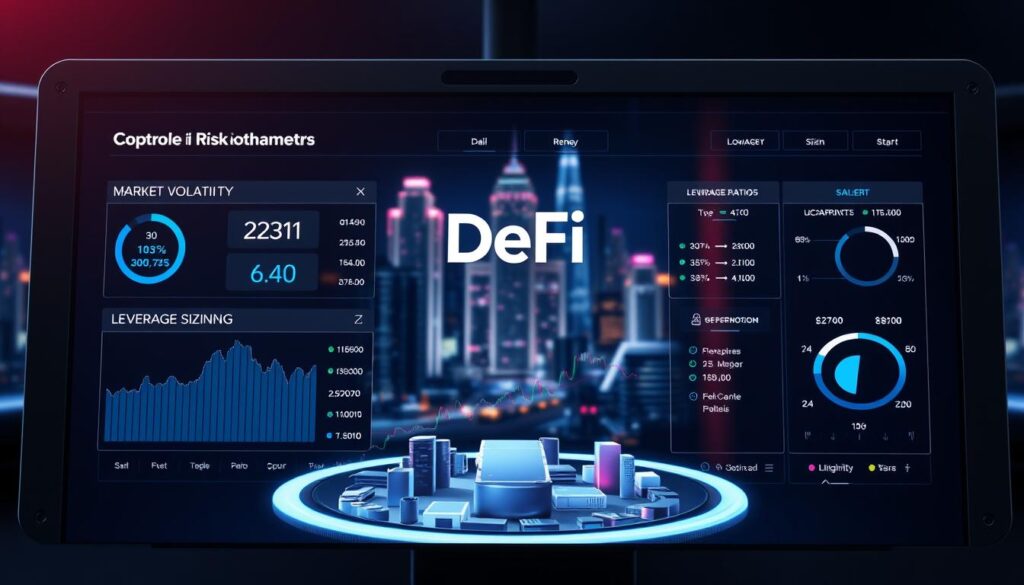The fusion of advanced technologies and decentralized finance is reshaping the financial landscape. By leveraging machine learning, autonomous systems are now capable of optimizing yields and executing trades with precision. This synergy, often referred to as DeFAI, is driving innovation across blockchain ecosystems.
According to recent projections, the blockchain AI market is set to surpass $980 million by 2030. These systems process real-time data across multiple chains, such as Ethereum and Solana, despite existing interoperability challenges. This capability enables automated trading strategies that operate 24/7, offering predictive analytics and risk mitigation.
Real-world implementations, like Virtuals’ cross-chain agents and Bankr’s AI wallet, showcase the practical benefits of this technology. Projects such as ChainGPT and Defi App are leading the charge, demonstrating the potential of AI-driven solutions in the decentralized finance space. This article explores how these innovations are transforming the way we approach financial markets.
Introduction to Artificial Intelligence in DeFi Trading Strategies
The integration of cutting-edge technologies is revolutionizing financial systems. At the core of this transformation are smart contracts, which serve as the backbone of decentralized ecosystems. These self-executing agreements enable seamless transactions, while AI enhances their capabilities with predictive analytics.
One standout application is AI-powered decentralized exchanges (DEXs). These platforms optimize liquidity, reducing slippage by 40-60%. By analyzing market trends, they ensure smoother trades and better pricing for users. This efficiency is a game-changer for traders seeking to execute trades with minimal friction.
Machine learning plays a pivotal role in price prediction. By studying historical volatility patterns, AI models forecast price movements with remarkable accuracy. However, challenges like data bias in training sets can affect trade precision. Addressing these issues is crucial for reliable performance.
Practical use cases further highlight AI’s potential. For instance, AI audit tools detect 92% of vulnerabilities in smart contracts before deployment. This proactive approach enhances security and trust in defi protocols. Additionally, AI-optimized yield farming platforms outperform traditional methods, offering higher APYs.
Projects like ChainGPT are leading the charge. Their Web3 chatbot handles over 15,000 daily trading queries, providing real-time insights. For a deeper dive into these innovations, explore our in-depth exploration of AI in decentralized.
The Evolution of DeFi and AI Integration
The journey of combining advanced systems with decentralized systems has been transformative. This integration has paved the way for a new era in finance, where technology drives efficiency and innovation. From early prototypes to sophisticated models, the evolution has been marked by significant milestones.

From DeFi to DeFAI: A New Era
The transition from traditional decentralized systems to advanced, integrated models has been remarkable. Early prototypes in 2021 laid the foundation for today’s agent-to-agent economies. These systems now leverage deep Q-network governance models, moving beyond rule-based bots.
One standout example is Virtuals’ GAME engine, which processes 1.2 million transactions per hour. This showcases the scalability and efficiency of modern protocols. The shift has also introduced new opportunities for users and developers alike.
Key Milestones in AI-Driven DeFi
The growth of AI-driven projects has been exponential, with a 300% increase since 2023. However, challenges like cross-chain interoperability remain, with a 78% agent failure rate. Addressing these issues is crucial for seamless operations.
Security has also evolved significantly. Machine learning-driven fraud detection has reduced hacks by 67% since 2022. Regulatory changes, like the SEC’s 2024 guidelines on AI-based liquidity pools, are shaping the future of this technology.
These advancements highlight the potential of integrated systems in finance. As the landscape continues to evolve, the focus remains on enhancing security, scalability, and user experience.
How AI Enhances DeFi Trading Efficiency
Advanced systems are transforming how financial operations are executed. By leveraging cutting-edge tools, decentralized platforms are achieving higher levels of precision and speed. This shift is particularly evident in the way trading and transactions are managed.
Automated Bots
Automated bots are revolutionizing the way trades are executed. These systems outperform human traders by delivering a 23% higher annual ROI. By analyzing vast amounts of data, they identify patterns and execute trades with unmatched speed.
For example, Bankr’s advanced wallet executes arbitrage opportunities in just 0.47 seconds. This level of efficiency ensures users maximize their returns while minimizing risks. Additionally, these bots reduce gas fees by predicting optimal transaction timing.
Real-Time Analysis
Real-time analysis is another key advantage. Systems process over 500,000 social media posts per hour using NLP to gauge market sentiment. This data-driven approach enables smarter strategies and better decision-making.
Backtest results show LSTM models predicting ETH price movements with 82% accuracy. Such precision allows users to stay ahead of market trends. Moreover, advanced market makers have increased DEX volumes by 140%, enhancing liquidity.
However, challenges like overfitting during bull/bear transitions remain. Addressing these issues is crucial for maintaining reliable performance.
Risk Management in AI-Driven DeFi Trading
Effective risk management is a cornerstone of modern financial systems. In decentralized ecosystems, advanced tools are essential for safeguarding assets and ensuring stability. These systems leverage predictive analytics and robust security measures to address potential threats.

Predictive Analytics for Risk Assessment
Predictive analytics play a crucial role in identifying and mitigating risks. For instance, AI models flag 94% of impermanent loss scenarios, helping users avoid significant losses. These tools analyze historical data and market trends to provide actionable insights.
Stress tests have shown that dynamic rebalancing can withstand 50% market crashes. This capability ensures that portfolios remain resilient even during extreme volatility. Federated learning models further enhance privacy, protecting user data during analysis.
AI in Fraud Detection and Security
Fraud detection has seen remarkable advancements with the integration of deep learning. These systems detect phishing attacks with 99.3% accuracy, significantly reducing vulnerabilities. AI-powered audits have saved $240M by identifying smart contract flaws before deployment.
Regulatory compliance is also streamlined through AI-driven KYC processes, which reduce false positives by 68%. Additionally, Nexus Mutual’s AI claims processing cuts approval times to just four hours, improving efficiency and user trust.
AI-Powered Yield Optimization Strategies
Modern technology is reshaping how we approach financial growth. By leveraging advanced tools, users can now maximize their returns while minimizing risks. These systems focus on optimizing yield and enhancing liquidity, making them essential for modern investors.
Maximizing Returns with AI
AI-driven systems are transforming how we manage investments. For instance, AI-optimized pools are yielding 18.7%, compared to manual strategies at 12.4%. This significant difference highlights the power of reinforcement learning in multi-protocol yield aggregation.
Projects like Defi App’s Superapp have boosted user returns by 33% through machine learning. These tools analyze over 120 factors per pool, ensuring the best strategies are employed. Additionally, AI rebalancing has reduced idle assets by 62%, improving capital efficiency.
Balancing Risk and Reward
Risk management is a critical aspect of financial optimization. AI reduces impermanent loss exposure by 41% in automated market makers (AMMs). This ensures that portfolios remain resilient even during market volatility.
Automated harvesting strategies have also saved users 23% in tax liabilities. By continuously monitoring market conditions, these systems provide a balanced approach to risk and reward. This makes them invaluable for long-term financial planning.
The Role of AI in DeFi Governance and Decision-Making
The role of advanced systems in decentralized governance is reshaping how decisions are made. These tools are enhancing transparency, efficiency, and security in decentralized autonomous organizations (DAOs). By automating complex processes, they empower users to participate more effectively in governance.

AI in DAO Governance
AI is transforming DAO governance by improving voting accuracy and speed. For instance, predictive models forecast proposal outcomes with an 89% success rate. This ensures that decisions are based on data-driven insights rather than speculation.
In trials with MakerDAO, governance automation reduced decision cycles by 72%. This efficiency allows DAOs to respond quickly to market changes. Additionally, AI tools like Aave’s delegate analyze over 50 risk parameters per proposal, ensuring thorough evaluations.
Automated Proposal Analysis
Automated analysis tools are enhancing transparency in governance. SHAP values explain the rationale behind AI voting, making processes more understandable for users. This builds trust and encourages broader participation.
AI also plays a critical role in security. Graph neural networks (GNNs) detect 98% of fake identities, preventing Sybil attacks. Reputation systems, powered by machine learning, allocate governance power based on credit scores, ensuring fair representation.
Legal compliance is another area where AI excels. Natural language processing (NLP) automates SEC Form D filings, reducing administrative burdens. These advancements highlight the potential of AI to streamline governance and decision-making in decentralized systems.
Challenges and Limitations of AI in DeFi Trading
While the potential of advanced systems in decentralized ecosystems is undeniable, several challenges persist. These hurdles can impact the efficiency, fairness, and scalability of modern platforms. Understanding these limitations is crucial for improving the experience of users and developers alike.
Data Dependency and Bias
One of the most significant challenges is the reliance on high-quality data. A recent audit revealed that 34% of training sets contain temporal leakage, which can skew results. This issue undermines the accuracy of predictive models and can lead to flawed decision-making.
Bias is another critical concern. For example, gender-skewed lending models approved 23% fewer female applicants. Such biases can perpetuate inequality and reduce trust in platforms. Addressing these issues requires rigorous data validation and diverse training sets.
Interoperability and Market Fragmentation
Interoperability remains a major hurdle in decentralized ecosystems. Cross-chain arbitrage, for instance, loses 18% of its value to fees. This inefficiency limits the potential of advanced systems to operate seamlessly across multiple chains.
Market fragmentation further complicates matters. Single-chain strategies yield a 57% higher ROI compared to cross-chain approaches. This disparity highlights the need for better integration and standardization across platforms.
- User education gaps: 68% of users misunderstand risk parameters, leading to poor decision-making.
- Regulatory uncertainty: 14 jurisdictions have conflicting guidelines, creating compliance challenges.
- Technical debt: Legacy system integration costs the industry $19M annually, slowing innovation.
These challenges underscore the importance of addressing data quality, bias, and interoperability. By tackling these issues, the experience of users and the efficiency of platforms can be significantly improved.
The Future of AI in DeFi Trading
The future of finance is being reshaped by emerging technologies, offering new opportunities for growth and innovation. Quantum-resistant models are set to launch by 2026, ensuring enhanced security in the crypto space. Adoption is accelerating, with forecasts predicting that 83% of hedge funds will integrate these systems by 2027.
Regulatory advancements are also on the horizon. Autonomous compliance bots will streamline SEC processes, reducing administrative burdens. User experience is evolving too, with brain-computer interfaces enabling seamless strategy input.
Institutional involvement is growing, highlighted by BlackRock’s $5B fund targeting this space. Sustainability efforts are gaining traction, with green validators cutting energy use by 74%. By 2030, these systems are expected to manage 60% of total value locked in decentralized platforms, marking a transformative era in technology.
FAQ
How does AI improve efficiency in decentralized finance?
AI enhances efficiency by automating tasks like executing trades and analyzing market trends in real time. This reduces manual effort and speeds up decision-making processes.
What role does AI play in risk management for DeFi?
AI uses predictive analytics to assess risks and detect fraud. It helps users make informed decisions while minimizing potential losses in volatile markets.
Can AI optimize yield in decentralized finance platforms?
Yes, AI-powered tools analyze data to maximize returns by identifying the best opportunities for lending, borrowing, and yield farming while balancing risk.
How does AI contribute to DeFi governance?
AI assists in DAO governance by automating proposal analysis and improving decision-making processes. It ensures more efficient and transparent governance systems.
What are the challenges of using AI in DeFi trading?
Challenges include data dependency, potential bias in algorithms, and interoperability issues due to market fragmentation. These can impact the effectiveness of AI-driven strategies.
What is the future of AI in decentralized finance?
The future involves advanced machine learning models, improved security, and seamless integration with DeFi protocols, creating more opportunities for users and traders.


No comments yet